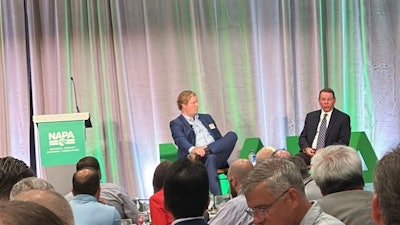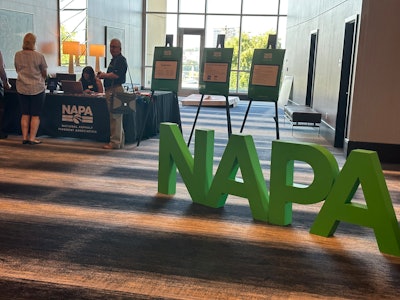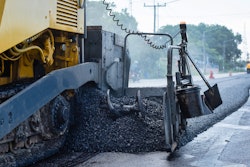
They discussed a number of important topics, including: the important role of infrastructure, the priorities of the regulatory arm in Washington, the continued appropriations of IIJA funds, as well as what could be on the future horizon beyond that legislation.
Graves spoke about his time since taking over as the head of the committee, and his desire to lead in a more bipartisan way. His role in the government gives him an extraordinary amount of influence over the future of the asphalt industry.
“You have two types of law,” said Graves. “You have statutory law, which we vote on, moves through the process through Congress, and then the President signs it. The other is regulatory law, and it’s more dangerous, because bureaucrats will change the intent of a provisioner to suit their agenda.”
Harsh Words For “Buy American”
Graves was specifically critical of the current administration’s “Buy American” policy, arguing that it isn’t always possible or reasonable to expect the construction industry to source all their materials domestically. Additionally, he lamented the policy as lacking “clarity” on what exactly constitutes a qualifying item, and what doesn’t.
 The registration desk for the NAPA midyear conference in Kansas City, MO.Brandon Noel
The registration desk for the NAPA midyear conference in Kansas City, MO.Brandon Noel
“There's just a lot of product that justs isn't produced in the United States, and all that does is increase the costs,” he said. “It creates problems with absolutely every project out there.” During the time of the conversation no alternative or solution to the policy was put forward.
Elam brought up the subject of the Federal Highway Trust Fund’s pending insolvency, and its repeated reliance on general fund transfers. The conversation veered towards the political impossibility of raising the gas tax (not done since 1993), the increased number of electric vehicles (EV) on the road, and the potential for a vehicle miles traveled (VMT) system of taxation.
“If you want to use the road, you have to pay for the use of the road,” Graves said. “We're seeing the trust funds are depleted. We must figure out whether the answer is maintaining the fuel tax for traditional vehicles while doing VMT or some other method for electric. We have to recover those dollars, and we have several pilot projects out there.”
In a positive anecdote for the industry leaders present, the congressman told the NAPA members that within the committee there are constant back-and-forth talks about concrete and asphalt applications. You could almost feel the room holding their breath. Then he explained his Chief of Staff Nick Christensen, who’s family is rooted in the asphalt business, meets all those conversations with the simple response, “Pave it black.”
Final Thoughts On The Dialogue
Near the end of the discussion, the floor was opened for questions from the audience. In response to one asphalt producer from California (Robert Dugan, President and CEO, CalCIMA), Graves got a little off topic, seemingly falling back on familiar political talking points.
He criticized those in favor of higher taxes on the wealthiest Americans, those not returning to work by remaining in remote positions, the ills of socialism, and a few negative statements about the American education system that didn’t relate to anything else the conversation had been previously focused on.
“I wanted to know what keeps him up at night,” said Robert Dugan outside the session shortly afterwards. “What keeps him up at night that he would want us to know about, in our industry, that could make his job easier.”




















